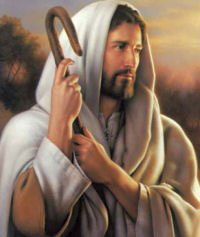
Daily Readings for: April 18, 2012
(Readings on USCCB website)
Collect: As we recall year by year the mysteries by which, through the restoration of its original dignity, human nature has received the hope of rising again, we earnestly beseech your mercy, Lord, that what we celebrate in faith we may possess in unending love. Through our Lord Jesus Christ, your Son, who lives and reigns with you in the unity of the Holy Spirit, one God, for ever and ever.
Wednesday of the Second Week of Easter
Jesus declared publicly: "Whoever believes in me, believes not in me but in him who sent me. And whoever sees me, sees him who sent me. I have come into the world as light, so that whoever believes in me may not remain in darkness. If anyone hears my words and does not keep them, I am not the one to condemn him; for I have come, not to condemn the world, but to save the world. The one who rejects me, and does not receive my word, already has a judge: the very word I have spoken will condemn him on the last day. For I have not spoken on my own authority; the Father who sent me has instructed me in what to say and how to speak. I know that his commandment is eternal life, and that is why the message I give, I give as the Father instructed me (Jn 12:44-50)."
Whoever believes in me, believes not in me but in him who sent me
Jesus cries out; He cries out just as someone who is saying words everybody should clearly listen to. His clamor synthesizes his saving mission, as He has come "to save the world" (Jn 12:47), but not on his own but in the name of "the Father who sent me and has instructed me in what to say and how to speak" (Jn 12:49).
It is not yet a month ago when we were celebrating the Paschal Triduum: how much present was the Father in the final hour, the hour of the Cross! As His Holiness John Paul II has written, "Jesus, overwhelmed by his foreknowledge of the trial waiting for him, alone before God, invokes him with his usual and tender expression of trust: ‘Abbá, Father’." The next hours clearly show the intimate dialogue of the Son with the Father: "Father, forgive them, for they do not know what they are doing" (Lk 23:34); "Father, into your hands I commend my spirit" (Lk 23:46).
The importance of this work by the Father and his Messenger, well deserves the personal response of he who is listening. This response is to believe, that is, a profession of faith (cf. Jn 12:44); faith that gives us the light — by the same Jesus — so that we shall not remain in darkness. But, he who rejects all these gifts and manifestations, and does not listen to those words "already has a judge: the very Word I have spoken" (Jn 12:48).
Therefore, to accept Jesus is to believe in, see and listen to the Father, not to be in darkness, to obey the command of eternal life. We certainly deserve Saint John of the Cross' rebuke: "[The Father] with this Word said everything in one go (...). Consequently, if you would like to ask God now, or should you pretend some kind of vision or revelation, it would not only be a piece of nonsense, but an offense for God, for not looking up only at Christ without asking for any other thing or novelty."
Fr. Julio César Ramos González SDB (Salta, Argentina), Contemplating Today's Gospel